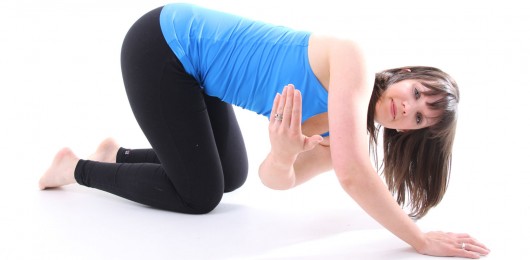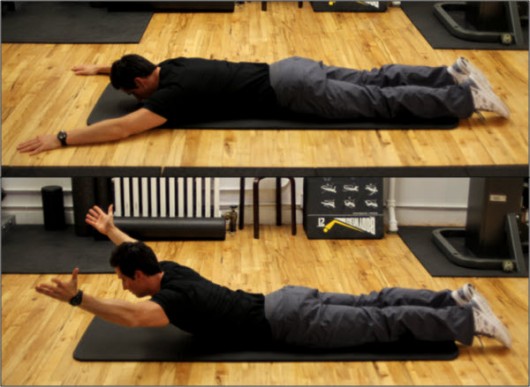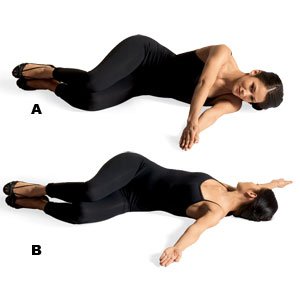You look more like the Hunchback of Notre Dame than Arnold Schwarzenegger? Read on for some key exercises to fix bad posture.
[spoiler title=”tl;dr – click to read summary” style=”fancy”] Bad posture can be reversed with daily practice. Effective and easy to do exercises include brdiges, spine rotations and shoulder stretches. [/spoiler]Exaggerated curvature of the spine as in the “hunchback” posture is termed kyphosis. There are several factors that can lead to this unnatural curvature, including excessive amounts of time in poor seated positions (couch/office chair); muscular imbalances through the posterior chain (including spinal muscles, gluteal muscles and neck) and of course ‘stooping’ — a problem mainly with tall people who have to constantly orient their head downwards to interact with others and their environment.
What Leads to Hunchback Posture?

The spine is under a tremendous amount of pressure to maintain an upright posture. Muscles of the neck must be strong and properly balanced in order to keep the head in a stable upright position. The problem, however, is much more complex than just neck position. Kyphotic curvature of the spine manifests in the upper (thoracic) region but it often originates from musclular problems further down the body.
Here is a brief list of muscle groups that affect your posture:
- Hip extensors: gluteus maximus and hamstrings
- Hip flexors
- Spinal erectors (deep muscles that support the spinal column)
- Trunk flexors: abs and obliques
- Internal rotators such as the muscles in the chest and the lats
- External rotators such as the muscles of the upper back and the rear of the shoulders
- Shoulder blade (scapula) muscles including elevators, retractors and depressors.
This is a general list but as you can see, any muscle involved in moving the shoulder blades, supporting the spine or maintaining correct hip posture will influence your postural alignment.
For this reason, exercises that focus solely on the upper back and neck regions won’t be sufficient to counter a kyphotic spine.
Believe it or not but the muscles that align the hips are often to blame for many postural problems. Poor gluteal, hip flexor and hamstring activation in daily movements cause the pelvis to tilt forwards. This anterior pelvic tilt pulls the spine with it. If the spinal curvature is compromised in this way in the lower back the upper body will be forced to compensate by widening the arc of the upper spine. Over time this becomes set in place and gets worse if not corrected.
Excercises to Fix Bad Posture
Knowing that the problems in thoracic spine curvature originate in poor muscle activation in the core helps you construct an exercise regime that will benefit your entire posterior chain. This also means less crippling problems in the lower back, more even activation of muscles in the hips and glutes and better overall movement.
The first step in fixing poor posture is to start at the root cause. Stretch your hip flexors, hamstrings and lower back. Focus on strengthening the abs and glutes. Activating these muscles groups prevents imbalances rotating the pelvis forward and setting off a domino effect of dysfunctional movement.
Below are a handful of exercises that will recreate healthy postural alignment. We also have e a sample daily workout to show how to integrate these into your life.
1) Bridges

Since stooping forward is very easy for the body to do, the Bridge and Bridge Holds help train your muscles and joints to be comfortable bending backwards. Bridges help reverse the naturally tendency of the body to stoop forward while activating all the muscles of the posterior chain.
Think of the Bridge as a functional correction exercise that wakes up the glutes and strengthens the deep muscles of the spine.
As you get stronger, progress to more challenging Bridge variations, such as the Full Bridge that requires arching your back so only your hands and feet are supporting you. You can perform these as isometric holds (think of it as a reverse Plank) or lower your torso down and perform reps.
2) Crucifix Stretches

Excessive amounts of time in seated positions causes the muscles in both the lower and upper back to shorten, leading to poor posture.
The Crucifix Stretch is so good at undoing these shortened muscles that you should do it every day.
How to do it: Stand tall with your arms extended out to your sides and shoulder height. Turn your wrists so your thumbs face backwards and pull your arms back as if stretching the chest. Hold and then return to perform another rep.
3) T-Spine Rotations

Thoracic (T) Spine Rotations are essential for increasing mobility in the thoracic spine region. The thoracic spinal region evolved for flexion, extension and rotation. People with kyphotic spines have poor mobility in this region so T-Spine Rotations address this issue nicely.
How to do it: Get on all fours with your arms at full length and hands just in front of your shoulders. Take your right hand and hold the back of your head. Move your elbow in a rotation underneath your left pectoral muscle. Reverse the rotation until your elbow is overhead, trying to move rotate as far s possible. Make this movement effective by keeping your gaze fixed on the moving elbow.
4) Scapular Wall Slides

Wall Slides mobilize the thoracic spine through extension while providing for good mobility through the shoulders. This exercise also strengthens the scapular retractors and is regard as one of the best remedial exercises for hunchback posture.
How to do it: Stand about 12 inches away from a wall, facing out into the room. With your arms in a ‘W’ shape, hands facing up, push your hands up the wall until they reach a ‘Y’ position. Contract your shoulder blades to return your arms to the ‘W’ position.
5) Lying Y Handcuff

This is a great exercise, named by legendary athletic trainer Joe DeFranco. The benefits you will get from this exercise include stronger muscle of the rotator muscles in the upper back as well thoracic and shoulder mobility.
How to do it: Lie face down with your head of the floor and lower back slightly hyperextended. With your hands in a ‘Y’ position out in front of you and thumbs pointing up, pull the arms back in an arc until your hands meet behind your back (think handcuff position). Reverse the arc back around until you’re at the start again.
When done properly you’ll feel a nice burn in your upper back and it makes a nice upper body warm up exercise before lifting weights.
Make Good Posture a Daily Commitment
Bad posture comes about through repeated daily practice of bad movements so it makes sense that resurrecting your posture will take a daily commitment.
Aside from practising better posture at your workstation and when standing/walking, you’ll need to perform at least 10 minutes of corrective exercise daily.
If you’re already working out you can use this little routine as a great warm up. You’ll find the mobility exercises will help grease your joints and activate the muscles necessary for efficient movement.
Here’s a sample routine you can use. Any resistance training you do to supplement these exercises is a bonus.
Day Stretches
Perform the following stretches throughout the day, especially after periods of sitting down:
[table]| Stretches | Reps |
| Crucifix Stretch | 5-10 reps, hold each stretch for 3 seconds |
| Hamstring stretch | Perform a hamstring stretch of your choice, holding 30 seconds. |
Mobility Warm Up

Perform as a circuit.
One round is best for warm up. Two rounds for posture corrective purposes. Rest briefly between exercises:
[table]| Exercises | Reps |
| Crucifix Stretches | 5-10 reps, 3 second hold |
| Bridges | Isometric hold for 30 seconds. Use whichever form of bridge is suitable for your current strength level. |
| Lying Y Handcuffs | 10 reps |
| Scapula Wall Slides | 12 reps |
| T-Spine Rotations | 12 reps (6 rotations per side). |
When performing these exercises emphasize quality of movement and good form over rep goals and fatigue. The purpose of these exercises is to improve your posture and movement so be sure to maintain quality movement throughout the entire set.
You can do the routine every day (recommended) but if you choose to do it every other day, make sure you at least stretch your hamstrings and do the crucifix stretch a couple of times per day. You’ll feel better for it trust me.
The five exercises listed represent some of the best movements you can do to fix your posture. Make these exercises part of your life and you will avoid the back problems many people face as they get older.



